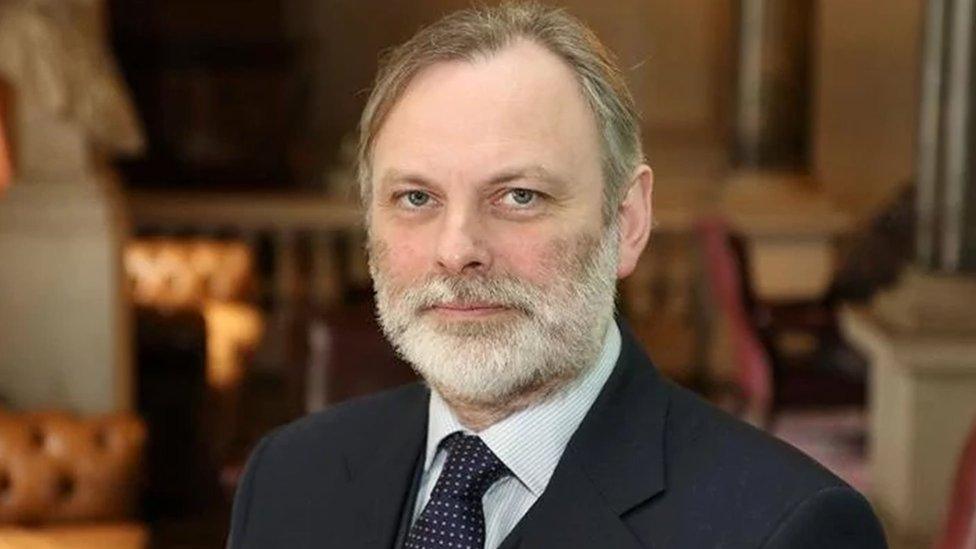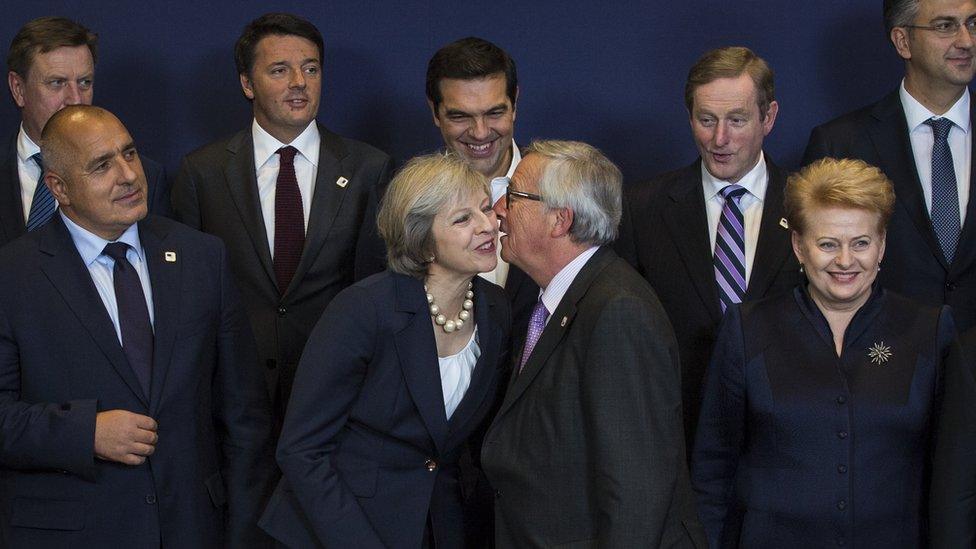Access to single market 'not on sale'
- Published
The single market "is not something that's on sale": Jonathan Faull
The UK will be unable to buy privileged access to the single market after it leaves the EU, says one of the top UK officials to have worked in Brussels.
Jonathan Faull, who retired last week, said that access to the single market "is not something that's on sale".
He also warned the UK should not assume it can broker a deal with Angela Merkel if she wins re-election as German chancellor.
Theresa May plans to trigger the Brexit negotiations by the end of March.
But Mr Faull said that Britain has one important card to play in the EU negotiations - co-operation on European defence.
The warnings by Mr Faull, who served in the European Commission for 38 years, come as the government scrambles to assemble its Brexit negotiating team in the wake of the resignation of the UK's EU ambassador, Sir Ivan Rogers.
He is to be replaced by Sir Tim Barrow, a former UK ambassador to Moscow.

Downing Street has called Sir Tim Barrow a "seasoned and tough negotiator"
In his interview with BBC Newsnight, Mr Faull cast doubt about an idea, which is being promoted by senior Whitehall officials, that the UK could pay for privileged access to the EU's single market.
This would be designed to circumvent the rules of the single market whose members, including Norway which is outside the EU, have to accept the free movement of people and the jurisdiction of the European Court of Justice.
David Davis, the Brexit secretary, confirmed last month that the government was considering the idea.
Mr Faull said: "Can you buy access to the single market? It's not something that's on sale in that way. I find that rather extraordinary."
The former European Commission official pointed out that Norway is bound by two core rules of the EU - accepting the free movement of people and abiding by the European Court of Justice.
Theresa May has indicated that she would like to have some access to the single market. But the prime minister is to confirm in a speech later this month that the UK will have two fundamental red lines in its Brexit negotiations - control of its borders and freedom from the ECJ.
It's the EU that will decide the terms of the Brexit deal, says Chris Patten
Mr Faull suggested that if the UK cannot accept the fundamental rules of the single market it would be regarded as a foreign country: "I don't think it is a question of buying your way somehow into the single market."
"You're a member of the single market as a member of the EU or the EEA. Or you're a foreign country outside it, and you conclude agreements with the EU - if you want to and it wants to - regarding the way in which your goods, services, capital and people move around.
"Or you don't and you have one or two international rules which apply and that's it, that's a choice to be made by both sides."
Newsnight was speaking to Mr Faull as part of a profile of Michel Barnier, the former French foreign minister who is the EU's chief Brexit negotiator.
Downing Street expects Barnier to adopt a hardline stance once the Brexit negotiations are formally under way when Theresa May triggers Article 50 of the Lisbon Treaty.
But in private, ministers believe that Angela Merkel will take a more benign approach if she wins re-election as German chancellor later this year.

Mr Faull warns that Theresa May's government could be in danger of repeating the mistake of David Cameron who believed that Mrs Merkel would come to his rescue. Mr Faull was the senior European Commission official involved in the Cameron negotiations.
"I think it would be a mistake to see the EU institutions as somehow wholly different from the 27 countries. These are all actors that will be working together on this," he said.
"I think one should look perhaps at the experience of the negotiations which took place before the referendum. where perhaps some similar thoughts were expressed and turned out not to be fully realised."
Mr Faull's remarks were endorsed by Lord Patten of Barnes. The former European commissioner told Newsnight: "There's an awful lot in the British press about what we'll get from them, what we'll negotiate from them. And I think it overlooks the fact - and I'm not making a 'why we should remain' point - the fact is they'll decide."
"They'll decide and we must hope that we can get as decent a deal as possible. But it's ultimately going to be decided in Paris and Berlin and some of the other member states."
The EU will want to keep close cooperation with the UK on defence and security - Jonathan Faull
But Mr Faull said that Mr Barnier will be well disposed to the UK in one key area - co-operation on defence led by France and the UK, Europe's two largest defence powers.
He said: "Michel Barnier has done a lot of work in recent years on defence and strategy issues and he believes the UK is absolutely crucial to the defence and security of Europe, the continent."
"And Franco-British cooperation in defence and security matters is extremely important and he will want - and I think all Europeans will want - a way to be found for that to continue."
"But that's more complicated if you're outside the EU, because part of the mechanisms used for this purpose are today EU mechanisms - so all of that will have to be looked into."
Nicholas Watt, external is political editor for BBC Newsnight